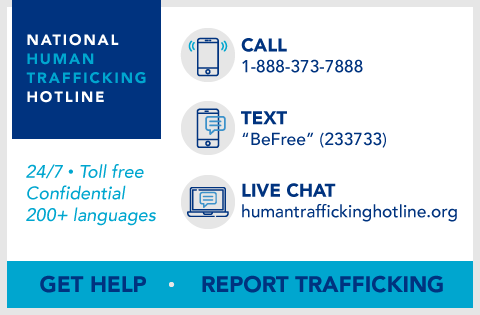The Truth About Being Trauma-Informed
May is Trauma Awareness Month, and those working with exploited or oppressed individuals are often very passionate and outspoken about being trauma-informed. But what exactly does it mean to be trauma-informed, and why does it matter?
To be trauma-informed is to be actively engaged with trauma-informed practices.
Even with the recent inundation of resources focused on achieving trauma-informed status over the past decade, sadly the research shows that being trained on trauma – what trauma is, its effects on a person, and how to help – is neither consistent¹ nor often translates to any real programmatic changes or trauma-informed practices in anything other than name². In fact, a 2020 study found that only one-third of trauma-informed service providers for trafficking survivors used their understanding and training about trauma in their daily, real-life work; the rest either reported utilizing their knowledge about trauma very little in their interactions with survivors or felt unsure as to how to practically implement trauma-informed practices in their workplace³.
While this is disheartening, it is a great opportunity to recognize that many in the field have the knowledge gathered from workshops and trainings but are in need of additional support in implementing those ideas; in actually creating safe, practical, healing-centered environments for survivors of trafficking. Perhaps confusion around why being trauma-informed practically matters is partially to blame. We know it matters because we’re told it does, but how many specifics can we name?
To be trauma-informed is to be survivor-informed.
It matters because when an individual who has historically been exploited is being told that he is now being empowered to make his own decisions but the options available do not take his lived experiences into consideration, why would he believe his voice will be heard? When organizational leaders encourage a woman that her story does not have to be an oppression narrative any longer but then gives her a list of requirements for her “healing journey” before she can be given a job, without ever asking her how she defines healing or wholeness, how will that woman ever learn to trust herself and stand on her own? If previously exploited persons are not feeling empowered or uplifted by the very people who have devoted their lives and careers to just that purpose, then what picture does that paint for their future? When viewed this way, it is not shocking that the rates of recidivism and re-trafficking are as high as they are.
To be trauma-informed is to be healing-centered.
As FBA states, up to 80% of people will be re-exploited with the absence of safe employment⁴. It is crucial for trafficking survivors to be offered dignifying, sustainable jobs that provide a livable wage. But it is likewise vital for employers to recognize their opportunity in assisting a person’s holistic healing.
Becoming a truly trauma-informed and healing-centered workplace is nuanced and sometimes feels at tension with itself. For example, an employer needs to clearly communicate the rights of the employee and teach survivor-employees what an employer can realistically expect of an employee. An employer needs to respect the employee as a whole being, not just a “victim,” and be aware that previous victimization could have created triggers that not even the employee is conscious of. It’s not always easy, but it is worth it.

When people are given employment opportunities that take their vulnerabilities and experiences into consideration while facilitating healing, they are given the space to explore what it means to move even beyond the label of survivor.”
And it’s this opportunity, to move beyond the label of survivor, where we will continue hearing stories of financial independence, being welcomed and valued as a part of a community, and individuals looking forward with hope and the confidence to achieve those dreams.
A note from the FBA:
During Trauma Awareness Month, we are actively examining practices within the Freedom Business movement.
We are encouraging ourselves and our Members to be curious, be humble, and evaluate what we’re doing well and what may need to be altered as we collectively work together for freedom.
Questions for reflection from Dr Skiera-Vaughn:
- Do people within your business feel safe?
- Do they feel as if their voices and choices matter?
- Do your HR policies reflect local cultural expectations?
- Are you being transparent and inviting suggestions from the very people you are striving to assist?
- Is there mutual respect?
Dr. Courtney Skiera-Vaughn holds a Ph.D in psychology with an emphasis on how culture affects behavior with a research focus around stress and trauma. She has worked in the counter-trafficking sector for over a decade and as the executive director of Free The Girls for the last 7 years, speaking on platforms around the world on issues of justice, reintegration, and cultural understanding.
______
¹ Knight, C. (2019). Trauma informed practice and care: Implications for field instruction. Clinical Social Work Journal, 47, 79–89. https://doi.org/10.1007/s10615-018-0661-x
² Jankowski, M.K., Schifferdecker, K.E., Butcher, R.L., Foster-Johnson, L & Barnett, E.R., (2019). Effectiveness of a Trauma-Informed Care Initiative in a State Child Welfare System: A Randomized Study. Child Maltreatment, 24,1:86-97, doi: 10.1177/1077559518796336
³ Chakoian, K., Sethi, R., & Santos, J. (2021). Trauma-Informed Practice in the Field: Recommendations for Human Tracking Service Providers. https://heller.brandeis.edu/iere/pdfs/trauma-informed-practice-in-the-field-1.pdf
⁴ Foundation, Thomson Reuters. “Jobs to Restore the Lives of Slavery Survivors and Prevent Re-Trafficking.” Trust Conference, https://www.trustconference.com/actions/i/?id=0598c1c2-c724-410d-a5e0-ac60fa9d7b8c
Related Articles
KAREN SCHMIDT STEPS DOWN
The Board of Directors of Freedom Business Alliance announces the upcoming departure of our Executive Director, Karen Schmidt.
A call to address modern labour exploitation
“Forced labour imposes significant economic and social burdens on society as a whole. It not only deprives individuals of their freedom and dignity but also perpetuates cycles of poverty, undermines economic development, and erodes social cohesion.”
MYTH vs REALITY: Debunking the Commonly Held Myths Around Human Trafficking
People often associate human trafficking with Jeffrey Epstein-type figures, fighting against Liam Neeson or a main character in the Sound of Freedom. And while these moments in pop culture did raise awareness for human trafficking in our modern era, they also created a lot of myths in their wake.



